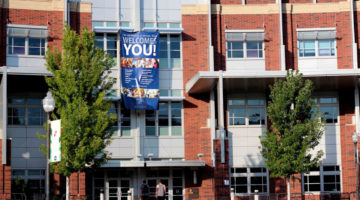
Photo courtesy of Tim Dunn/University of Nevada, Reno
Hillary Clinton (center) addresses a crowd in the University of Nevada, Reno’s Center for Molecular Medicine while student Courtney McKimmey (left) and former state Sen. Sheila Leslie (right) listen in during a town hall on Monday, Feb. 15. Clinton is locked in a dead heat in the polls with her opponent, Vermont Sen. Bernie Sanders.
By Jacob Solis
With Nevada’s third-in-the-nation Democratic caucus is less than a week away, the two Democratic candidates left in the race, former Secretary of State Hillary Clinton and Vermont Sen. Bernie Sanders, have stepped up their efforts to sway Battle Born voters. That includes campaigning on the campus of the University of Nevada, Reno, which saw both Democratic candidates and even the president of Planned Parenthood, Cecile Richards, visiting within the past week in the name of the campaign.
These visits come at a time where the Democratic race in Nevada is as close as ever. The only recent poll taken in the state, conducted by the marketing research firm TargetPoint, shows Clinton and Sanders locked in a dead heat with 45 percent of the vote apiece. It’s a dramatic reversal of fortune for the Clinton campaign, which had held a more than 20 percent lead before the new year.
On Wednesday, Planned Parenthood President Cecile Richards stopped by the Joe Crowley Student Union to talk to the Nevada Students for Hillary club about women’s health, and more specifically, why the Planned Parenthood Action Fund decided to endorse Clinton just one month ago.
“There was one candidate that stood head and shoulders above everyone else, and that was Hillary Clinton,” Richards said.
The Planned Parenthood Action Fund acts as the public policy and advocacy arm of the organization, and as a result has found itself in the thick of this year’s presidential contest. Even so, it waited until January to throw its endorsement behind Clinton, though this is the first primary endorsement the action fund has ever given out.
In a press release, Planned Parenthood took to the attack, calling the Republican vision for women one stuck in the 1950s. However, where the statement attacked Republicans, it made no mention of Bernie Sanders, who has quickly gained ground since his narrow victory in Iowa and massive victory in New Hampshire.
Acknowledging Sanders at the roundtable, Richards said that while he may have supported women’s issues on paper, he hasn’t done so to the degree that Clinton has.
“Bernie Sanders, who I know has a lot of supporters, has a very good voting record,” Richards said. “He’s made statements about where he stands on these issues. The difference with Hillary Clinton is that she’s actually been on the front line fighting for these issues.”
On Monday, Clinton herself came to UNR’s campus with largely the same goal as Richards. Talking to a closed audience of over 100 female students and other community members, she focused solely on health care and women’s health. In that vein, she was quick to attack Republican attempts to repeal ObamaCare and note that Sanders’ stance on health care, creating a single-payer system, is much easier said than done.
“I am dedicated to building on and improving the Affordable Care Act,” Clinton said. “My esteemed opponent, we share the same goal: universal health care coverage. He wants to move to a single-payer system which, I can tell you, will never pass the United States Congress. That will never happen.”
It’s an overture to women at a time when the Clinton campaign needs all the help it can get. Women voters have been a cornerstone of the Clinton campaign since it started last year, but most of those women are older — over 45. NPR noted that among millennial women, Sanders leads Clinton by nearly 20 points.
Despite all that, it hasn’t worried Clinton field organizer Tyler Hendricks, who remains confident that the campaign’s get-out-the-vote efforts will prevail.
“We’re seeing a lot of enthusiasm with students here,” Hendricks said. “I think that there are some differences [with voters] in other states, but [in Nevada] we’re positioned to do a lot better and we’re looking forward to caucus day.”

Breanna Denney/Nevada Sagebrush
Presidential hopeful Bernie Sanders addresses a crowd during a campaign rally in front of the Mathewson-IGT Knowledge Center Tuesday, Aug. 18, 2015. Sanders has gained a good deal of momentum in the primaries after a close loss in Iowa and big win in New Hampshire.
In the Sanders camp, the focus has been rooted in pulling out a surprise victory.
At an event dubbed “Real Solutions for Real People,” Sanders spoke to a packed room in the Jot Travis Building about his traditional stumping material — campaign finance, wealth inequality and the like — but also Nevada-specific issues. Addressing the current debate over solar energy in Nevada, Sanders reiterated a stance in favor of renewable energy.
Later that day, Sanders spoke to a larger crowd of more than 500 campaign volunteers in order to energize their canvassing efforts. Again, Sanders emphasized the element of surprise.
“We surprised them in Iowa,” Sanders said. “We surprised them in New Hampshire. We are going to surprise them here in Nevada.”
A strong showing in Nevada would be invaluable to the Sanders campaign, which has thus far struggled to show Sanders’ broad appeal outside the rather narrow demographics in Iowa and New Hampshire. Nearly 30 percent of Nevadans are Hispanic while 9 percent are black, according to the Census Bureau’s estimates for 2015. For comparison, almost 80 percent of Iowans and 94 percent of New Hampshire residents are white.
Outside of the demographic worries, the polls themselves may bode well for Sanders, who performed to expectations in both Iowa and New Hampshire. Even so, Sanders has been lagging in the so-called “Invisible Primary,” which tallies the number of endorsements from sitting congressmen and women in addition to prominent party leaders.
These people form the body of 712 superdelegates whose votes are unbound in the Democratic National Convention in July. This means that, unlike pledged delegates who are committed by the popular vote to support one candidate or another, superdelegates can vote for whomever they want regardless of primary outcomes.
At the moment, Clinton leads Sanders in superdelegates 362 to 8, according to FiveThirtyEight. It’s an early delegate lead that hasn’t been seen since George W. Bush ran in 2000 and presents an obstacle to Sanders that many of his supporters view as unfair.
Superdelegates were instituted by the Democratic National Committee so that the party establishment might push against grassroots candidates they disapprove of. Bernie Sanders appears to be one of those very candidates, but his current delegate deficit may not be all that telling. Clinton led then Sen. Barack Obama by 100 superdelegates in early 2008 — only to see that lead promptly erased as Obama picked up state after state in the primary.
What is clear, however, is that only the votes will tell how each candidate is really doing, and those will have to wait until Saturday.
Jacob Solis can be reached at jsolis@sagebrush.unr.edu and on Twitter @TheSagebrush.











